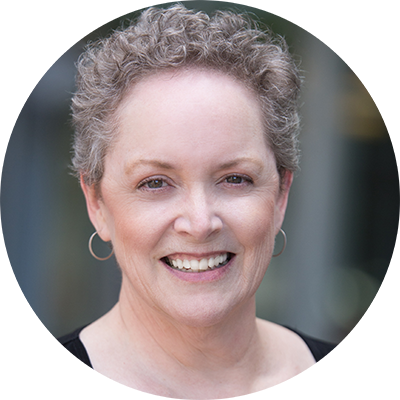Home > Doula Profile: Carole Silvoy
Doula Profile: Carole Silvoy
Carole is a former American Sign Language interpreter, a singer and actor, a lay minister, and a communicator who has done work in more various situations than she can count. She lives near Bethlehem, Pennsylvania, which is equally north of Philadelphia and west of New York City, with her husband and three cats.
Q&A with Carole
When and why did you decide to become an end-of-life doula?
When my grandmother Gladys died in August of 1990, it was the first time I was with someone and helped them cross over. Despite my sense of loss, coaching her as she went came so very naturally to me. After that, it happened seven or eight more times that I was with someone when they died, and it was never uncomfortable. Several times I was part of the time leading up to death and planning for it.
In April of 2018 I was having a reunion lunch with my longtime friend Reverend Mark English, who was visiting from Ohio, where he has long served as a hospice chaplain. In catching up, I shared some of my experiences and told him that sometimes I feel like a “reverse midwife.” Mark replied, “Carole, that’s a Thing. You have to look at INELDA.” When I did, it felt like such a good path to travel.
How long have you been doing this type of work?
After I did the INELDA training in Rockville, Maryland, in May of 2018, I had work conflicts which put doula work on a back burner. My plan was to go full speed in May of 2020 at the end of the school year. But then, well, COVID! I continued study and training online until 2022, when I began Good Death Companion and my doula work in earnest.
What type of environment do you work in?
I have been a visitor volunteer with hospice, but currently I am establishing my practice to hold space with people in various areas of grief and loss. Twice a month I lead Death Cafe in a virtual world called Second Life, with participants in their avatars from all over the globe.
I also feel a call to support people through the “Little Deaths”—loss of relationship, job, or home; the death of beloved animals; preparing for and carrying out the dissolution of a parent or loved one’s home. Holding space is a very rich process I can offer.
What do you do before you meet with a new client?
Having a very busy mind, I find it’s important for me to go quiet. I empty myself of the things on my mind, mentally setting them aside in a safe spot. Doing shadow work helps me really identify my own “stuff” and makes this a more gentle letting go process. In essence, I empty myself so I can really listen, and whatever that client needs can fill that cleared-out space.
Can you share a short anecdote or insight that changed you?
In my work as an interpreter for the deaf I often felt imposter syndrome. As a non-native ASL user, I always felt there had to be something missing from my language. When I spent those days in the INELDA training, and since, there was not a part of my heart or mind that felt doubt. I know I bring my authentic self to my work.
Who has been one of your teachers or mentors?
Amy Wright Glenn created and leads The Institute for the Study of Birth, Breath, and Death. I learn so much about myself when I read her books and share in her classes and groups. There’s so much gratitude in me that I get to know and learn from Amy.
What do you wish you had known when you started as a doula?
I wish I had known that there is no detailed blueprint for doing this work “the right way.” In preparing for this, it was so easy to put off the “doing” until I had all the “knowing” in perfect alignment. That was never going to happen!
Do you have any words of encouragement for fellow doulas?
Trust what you know. Set the questions aside for a moment and let that moment teach you.
What is your dream for your practice or doulas in general?
I feel a deep affinity for working with people online. After spending the last six years of my ASL interpreting work on the Zoom platform, I know I am quite comfortable in that format. There are so many times that beloved folk can’t be with the dying, and I aim to hold space with them to create their own experience of the transition, the loss, and also the celebration of a life. If I am not the primary doula, I can still work in support of other doulas in this special kind of outreach.
Because I have experience in the area of accessibility, I also wish to help make deathcare more available to all and in more ways. ASL interpreters can benefit from learning about a good death and how to interpret there, and doulas can benefit from learning about Deaf culture and how to work with interpreters. Audio description for the blind, sensory-friendly deathcare for families with neurodiversity, and best practices for accessible deathcare are also some good places to start!
Contact Carole
Web: Good Death Companion // Email: [email protected] // LinkedIn: Carole Silvoy

